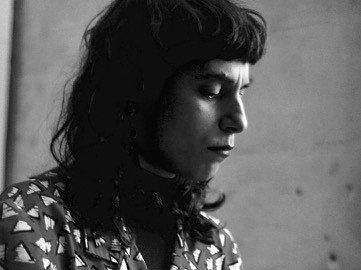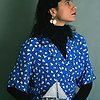Could you describe your creative process on the basis of a piece or album that's particularly dear to you, please? Where did the ideas come from, how were they transformed in your mind, what did you start with and how do you refine these beginnings into the finished work of art?
I have no fixed way of working. Each piece or song comes from a very different place. I am constantly experimenting and always sure it will take me somewhere interesting. But I will refer to a very dear piece to me; it’s called ‘With the Seagulls II’. I’ve spent a lot of time by the seaside, walking for hours, absorbing the views and observing the seagulls; the way they fly, the way they cry. I connect strongly with a seagulls’ cry; there is something very powerful to it. Seagulls are great survivors, they’re very wild especially because they live by the sea.
I wanted to make a piece that can express how I feel about them, this strange, wild, raw power. I came up with a minimalist, angular melody visualising the view of the sea and the lines the seagulls make when they fly across each other in the open sky. The melody is quite powerful and strangely unsettled. Then I thought about bringing in some actual sounds from my personal experience and blending them with the composition like a collage. I wanted to add real mystery to the piece, so I took my MiniDisk recorder and my stereo mic and recorded some sounds on the south coast. I recorded my footsteps running on the pebbles and the seagulls. I wanted to catch their wildest cries so I had the brilliant idea of buying a packet of chips. I waited till they got cold and I started throwing the chips up in the air and there was a real fight. I got the most amazing recording. So, the concept was to glue the sound photos (samples) of the seagulls and my footsteps onto the bigger painting of the angular minimalist melody, in order to see how this experiment might work and how I could convey my emotional experience.
There are many descriptions of the ideal state of mind for being creative. What is it like for you? What supports this ideal state of mind and what are distractions? Are there strategies to enter into this state more easily?
The ideal state of mind for me is total calmness and peace. I’m always full of ideas when I camp on a beach and spend time in the wild by the sea. It’s difficult to get that relaxed in a busy city like London with distractions and stresses from situations, to people, to noises. Small tricks that really make a difference in my daily city life, are walking and choosing healthy relationships with people. That way I make sunny decisions about things that I can control.
How is playing live and writing music in the studio connected? What do you achieve and draw from each experience personally? How do you see the relationship between improvisation and composition in this regard?
One thing about my music so far, is that, because of the fact that I like to experiment so much, I sometimes end up with pieces that are impossible to perform live. That’s ok. As for the pieces that I can actually perform live, I have allowed space for improvisation and doing things slightly different in order to better fit my live set and make it more organic for me to perform. It’s very rewarding when I manage to perform a different version of one of my tracks that had a strong and different character from the original recording. That happened when I performed ‘With the Seagulls II’ live at the Boiler Room.
Sometimes I start making a song by playing around with my live set-up, so I’m consciously preparing for a live scenario. But sometimes I just want to have fun exploring some crazy idea, and even if I cannot perform it live, it’s really interesting to listen to the final work just as a studio piece. With regards to the relationship between improvisation and composition, I would say that I like to keep things loose and airy. I like to use composition as the fundamentals upon which I build creatively and express freely, using it as the vehicle to open up to. The result could be magical.
How do you see the relationship between the 'sound' aspects of music and the 'composition' aspects? How do you work with sound and timbre to meet certain production ideas and in which way can certain sounds already take on compositional qualities?
I realised back in the dance college-years the importance of sound and how much feeling it could create. I learned to mix music pieces with sound effects just because it could take the audience to a more intense emotional state and I got really interested in this. I started seeing the potential of combining melody with manipulated sounds. When I got into ambient music after that and after reading David Toop’s ‘Ocean of Sound’, a new chapter begun. I started making soundscapes, mixing different sounds or recordings and I also started manipulating the recorded sounds, playing with the speed etc.
The sound aspects of music do often play a compositional role in my music. Apart from manipulating sounds, I love to do a sort of sound collage to all the music material that I have laid out. For example, I would use the sound of waves that I have recorded personally, as a crescendo type of drum sound. In this way, the waves do take on a compositional quality. I mix the cries of seagulls with my drum patterns and I get the sound collage effect which adds to the atmosphere and also they interfere rhythmically with the drum pattern. My beats are often created using my own samples of pebbles, shells and bells, that way there is a more personalised texture of this dimension of the composition.
I would like to refer to the actual sounds of the instruments, for example the sound of my conch. It is a very long, characteristic sound. I couldn’t replace it with any other sound, the piece would miss the point, this sound very much leads the composition. I sometimes get inspiration and begin writing a song just from the sound of the instrument, that, for example, is how I started writing ‘Captain Free’, just by playing around with this eccentric synth bass on my Roland piano. This sound wanted such a melody to be created. Lead compositional role I would say.
Our sense of hearing shares intriguing connections to other senses. From your experience, what are some of the most inspiring overlaps between different senses - and what do they tell us about the way our senses work? What happens to sound at its outermost borders?
I can hear melodies when I walk by the sea and watch the vast sky, the horizon, the seagulls flying, the clouds and the big blue. I get real inspiration from looking at paintings, looking at the view of the rocks of a dry Greek island, looking at the sunset or a colourful crowd of people having fun. The visual aspect of life is very important to me. This is why I often find myself feeling like I am painting an aural picture rather than composing a piece of music. You can really bring the senses very close to each other. I believe that you could actually hear a painting or smell or taste a piece of music. Just add the crackling sound of burning wood and you might get a smoky flavour with your music piece. No joke, I really mean this :)
Art can be a purpose in its own right, but it can also directly feed back into everyday life, take on a social and political role and lead to more engagement. Can you describe your approach to art and being an artist?
For me art has always been a survival tool. I need it in order to survive, it is that important to me. With art, I find meaning in everything I do and I become better. It brings balance to my life, be it the need to communicate or the need to express or the need to discover and develop my spirit. Art looks after and elevates my soul.
It is remarkable, in a way, that we have arrived in the 21st century with the basic concept of music still intact. Do you have a vision of music or an idea of what music could be beyond its current form?
We need to go back to the first reason we ever started making sounds and music to understand the root of the music creative process. It is for those who do this, that music will continue to evolve.



